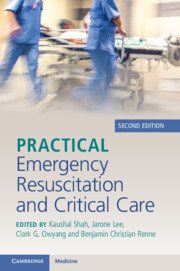Book contents
- Practical Emergency Resuscitation and Critical Care
- Practical Emergency Resuscitation and Critical Care
- Copyright page
- Contents
- Contributors
- Preface
- Section 1 General Critical Care
- Section 2 Infectious Disease Emergencies
- Section 3 Neurological Emergencies
- Section 4 Cardiovascular Emergencies
- 16 Post-Cardiac Arrest Care
- 17 Acute Coronary Syndrome
- 18 Acute Decompensated Heart Failure
- 19 Aortic Dissection
- 20 Hypertensive Emergencies
- 21 Valvular Diseases
- Section 5 Respiratory Emergencies
- Section 6 Gastrointestinal Emergencies
- Section 7 Renal Emergencies
- Section 8 Hematology–Oncology Emergencies
- Section 9 Endocrine Emergencies
- Section 10 Environmental Emergencies
- Section 11 Trauma
- Section 12 End of Life
- Index
- References
21 - Valvular Diseases
from Section 4 - Cardiovascular Emergencies
Published online by Cambridge University Press: 02 November 2023
- Practical Emergency Resuscitation and Critical Care
- Practical Emergency Resuscitation and Critical Care
- Copyright page
- Contents
- Contributors
- Preface
- Section 1 General Critical Care
- Section 2 Infectious Disease Emergencies
- Section 3 Neurological Emergencies
- Section 4 Cardiovascular Emergencies
- 16 Post-Cardiac Arrest Care
- 17 Acute Coronary Syndrome
- 18 Acute Decompensated Heart Failure
- 19 Aortic Dissection
- 20 Hypertensive Emergencies
- 21 Valvular Diseases
- Section 5 Respiratory Emergencies
- Section 6 Gastrointestinal Emergencies
- Section 7 Renal Emergencies
- Section 8 Hematology–Oncology Emergencies
- Section 9 Endocrine Emergencies
- Section 10 Environmental Emergencies
- Section 11 Trauma
- Section 12 End of Life
- Index
- References
Summary
Valvular diseases are classified either as obstructing outflow (i.e., stenosis) or inadequately closing/coapting (i.e., regurgitation). Many mild–moderate valve lesions exist in a compensated or well-tolerated state; the tenets of hemodynamic management become particularly important in the severe or acute setting.
Information
- Type
- Chapter
- Information
- Practical Emergency Resuscitation and Critical Care , pp. 187 - 196Publisher: Cambridge University PressPrint publication year: 2023
